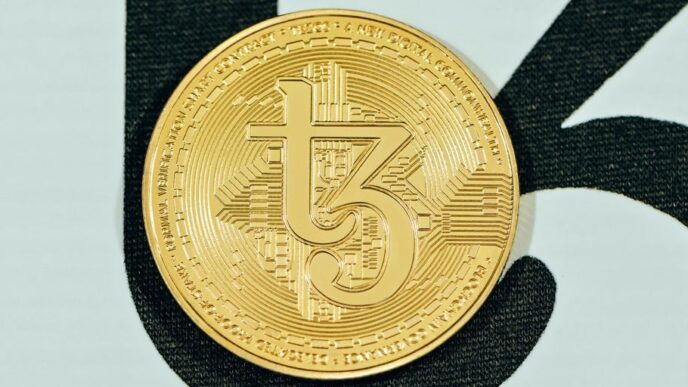Welcome to the thrilling world of digital currencies, where decentralized networks and groundbreaking technologies have revolutionized how we perceive money. While the allure of cryptocurrencies grabs headlines worldwide, it’s crucial not to overlook their dark companion: security risks. As more individuals delve into this realm brimming with potential profits, it becomes imperative to demystify cryptocurrency security and equip ourselves with foolproof strategies for navigating through this exhilarating but perilous landscape.
What Is Cryptocurrency?
Cryptocurrency is a digital or virtual currency that uses cryptography for security. A cryptocurrency is difficult to counterfeit because of this security feature. A defining feature of a cryptocurrency, and arguably its biggest allure, is its organic nature; it is not issued by any central authority, rendering it theoretically immune to government interference or manipulation.
Cryptocurrencies are decentralized, meaning they are not subject to government or financial institution control. Bitcoin, the first and most well-known cryptocurrency, was created in 2009. Since then, numerous other cryptocurrencies have been created. These are often called altcoins, as a blend of alternative coin.
Cryptocurrencies are often traded on decentralized exchanges and can also be used to purchase goods and services. Some countries have begun to accept cryptocurrency as legal tender. Cryptocurrency is still a relatively new phenomenon, but it is growing rapidly. As more people become interested in investing in cryptocurrencies, we are likely to see even more growth in this area.
The Benefits of Crypto
Cryptocurrencies have taken the world by storm, offering a new and innovative way to transact without the need for traditional banks or financial institutions. While there are many different cryptocurrencies available, they all share one common goal – to provide a secure and decentralized way of conducting transactions.
One of the major benefits of cryptocurrency is that it is much more secure than traditional fiat currencies. This is because cryptocurrencies use blockchain technology, which is a digital ledger that records all transactions in a secure and tamper-proof manner. This means that there is no need for third-party intermediaries such as banks, which can be susceptible to hacks and other security breaches.
Another benefit of cryptocurrency is that it offers users a high degree of anonymity. When conducting a transaction with traditional fiat currencies, your personal information (such as your name and address) is typically required. However, when using cryptocurrency, you can remain anonymous if you so choose. This makes cryptocurrency ideal for those who wish to keep their financial dealings private.
Cryptocurrency offers lower transaction fees than traditional methods. This is because there are no middlemen or third-party intermediaries involved in the process. Instead, transactions are conducted directly between peers, which helps to keep costs down.
So, what are you waiting for? If you’re looking for a safe and secure way to transact without having to worry about third-party institutions, then cryptocurrency is right for you!

Understanding Cyber Security Risks With Crypto
Cryptocurrencies are digital or virtual tokens that use cryptography to secure their transactions and to control the creation of new units. Cryptocurrencies are decentralized, meaning they are not subject to government or financial institution control. Bitcoin, the first and most well-known cryptocurrency, was created in 2009.
Since cryptocurrencies are digital and often stored on exchanges or wallets that are connected to the internet, they are susceptible to cyberattacks. Hackers can target exchanges or wallets in an attempt to steal funds or personal information. They may also target individual users in so-called phishing attacks. Phishing is a type of fraud that involves sending emails or other communications purporting to be from a trusted source in order to trick people into providing sensitive information or clicking on malicious links.
It’s important to be aware of the risks involved in using or investing in cryptocurrencies and to take steps to protect yourself from fraud and theft. When considering a cryptocurrency investment, do your research and only invest what you can afford to lose. Be sure to store your coins in a wallet that is offline and keep backups of your private keys in a safe location. Never share your private keys with anyone. By understanding the risks and taking steps to protect yourself, you can safely navigate the world of cryptocurrencies.
How to Protect Your Crypto Investments
If you’re like most people, the thought of investing in cryptocurrency is probably both exciting and scary. After all, digital currencies are still a relatively new phenomenon, and there’s always the risk that they could become worthless overnight.
That said, there are plenty of reasons to believe that cryptocurrency is here to stay, and that it could even become the future of money. If you’re thinking about investing in cryptocurrencies, then it’s important to do so safely. Here are some tips on how to protect your crypto investments:
1) Don’t keep all your eggs in one basket.
Don’t invest all your money in just one or two cryptocurrencies. Instead, spread your investments across a variety of different coins and tokens. That way, if one coin tanks, you won’t lose everything.
2) Use a reputable exchange.
When you buy and sell cryptocurrencies, you’ll need to use an exchange. Make sure to choose a reputable one with a good reputation for security.
3) Keep your coins off exchanges.
Once you’ve bought a cryptocurrency, it’s generally best to avoid keeping it on an exchange for too long. Instead, move it into a wallet that only you control. That way, even if an exchange gets hacked, your coins will be safe.
4) Enable two-factor authentication (2FA).
Whenever possible, enable two-factor authentication (2FA) for additional security. This means that in addition to a password, you’ll need another form of verification, such as your smartphone, before you can access your account.
5) Use secure passwords.
Make sure to use strong passwords for any accounts related to cryptocurrency. Don’t reuse the same password across multiple accounts, and use a password manager if necessary to keep track of them all.
6) Be aware of scams.
Cryptocurrency-related scams are common these days, so it’s important to be careful. Never send money to someone promising an investment return; research anything that looks too good to be true; and never click on links or attachments from unknown sources via email or social media.
Security Tips for Storing and Using Cryptocurrencies
There is no doubt that cryptocurrencies have taken the world by storm. In just a few short years, they’ve gone from being an obscure concept to a widely-accepted form of payment and investment. As more and more people adopt cryptocurrencies, it’s important to be aware of the security risks involved in storing and using them. Here are some tips to help you safely navigate the world of digital currencies:
- Keep your private keys safe and secure. Your private keys are what allow you to access your cryptocurrencies, so it’s important to keep them safe and secure. One way to do this is to store them offline in a paper wallet or hardware wallet. This reduces the risk of them being stolen by hackers or lost if your computer is damaged or hacked.
- Don’t store all of your cryptocurrencies in one place. It’s important to spread your holdings across different wallets and exchanges so that you’re not putting all your eggs in one basket. This minimizes the risk of losing everything if one platform is compromised or experience technical issues.
- Be careful with whom you share your personal information. When setting up a cryptocurrency wallet or account on an exchange, you’ll need to provide some personal information such as your name, email address, and date of birth. Be careful with whom you share this information as it could be used by criminals to steal your identity or hack into your accounts.
- Enable two-factor authentication (2FA). Many wallets and exchanges offer the option of two-factor authentication (2FA). This adds an extra layer of security to your account by requiring you to provide both a username and password, as well as a one-time code generated by an app or sent via SMS.
- Be wary of phishing attempts. Phishing is a technique used by criminals to obtain personal information such as usernames and passwords by pretending to be a legitimate website or company. Be vigilant and never enter sensitive information on suspicious websites.
- Use secure internet connections when accessing your wallet or exchange accounts. When accessing your cryptocurrency wallet or exchanging account online, always ensure that you’re using a secure connection such as a virtual private network (VPN). This will help protect your data from being accessed by malicious actors.
Tools and Services to Help Maximize Digital Currency Protection
When it comes to digital currency, there are a few tools and services that can help maximize protection. One of the most important things to do is to make sure that private keys are well-protected. This can be done by using a hardware wallet or by using a service that provides multi-factor authentication. Additionally, it is important to keep track of digital currency activity and be aware of any suspicious activity. It is also a good idea to have a backup plan in place in case of any unforeseen events.
Conclusion
Cryptocurrency has become an increasingly popular option for those looking to invest, trade, and store value securely and without inflation. Although the technology is still relatively new and can come with its own set of risks, understanding some basic security best practices can help protect your assets while safely navigating this exciting new world of digital currencies. By using the tools available to you – such as strong passwords, two-factor authentication, and hardware wallets – you can ensure that your funds are kept safe from malicious actors while also taking advantage of all the benefits that cryptocurrency has to offer.













